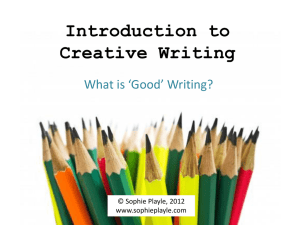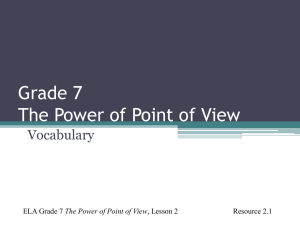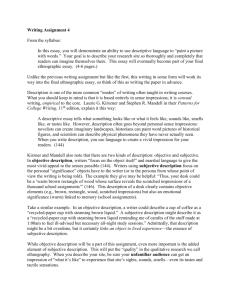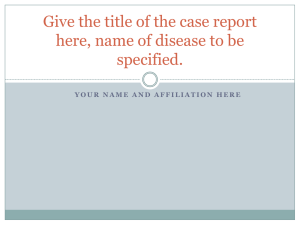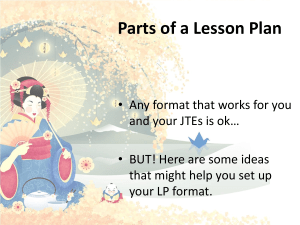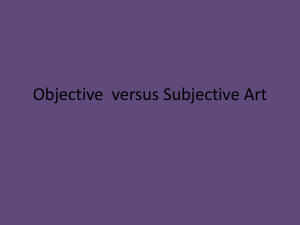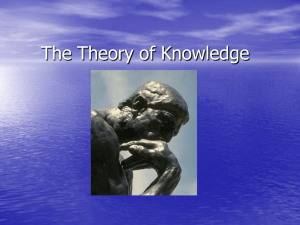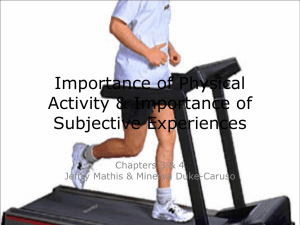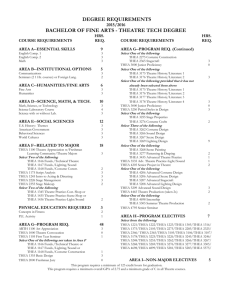Theory of Knowledge essay
advertisement
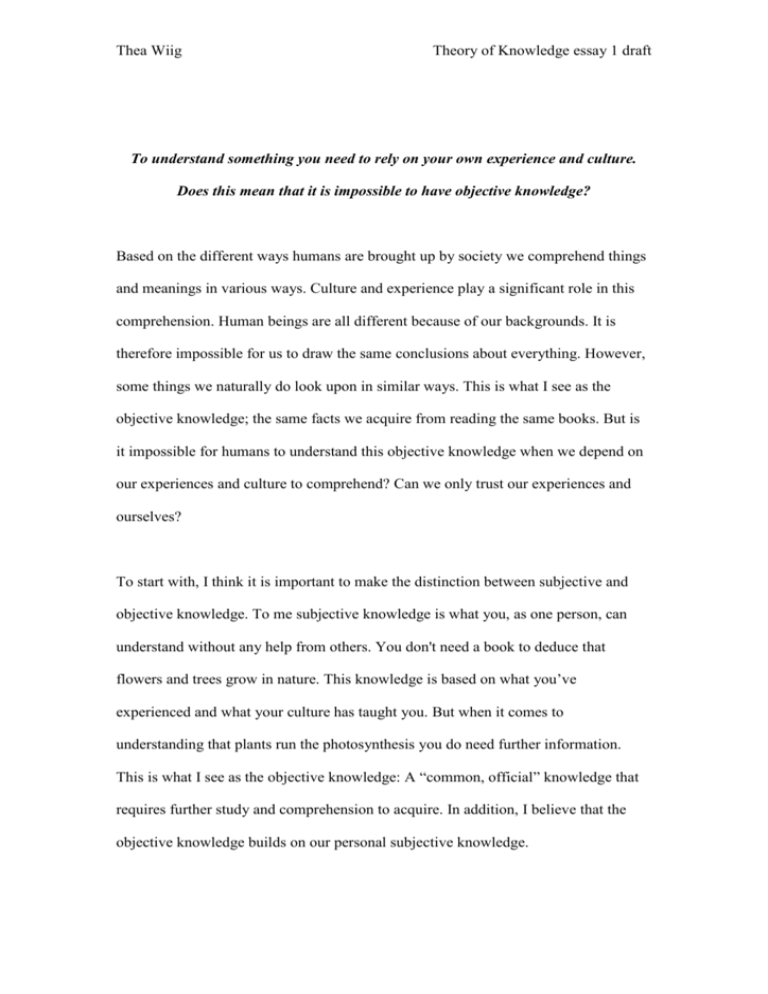
Thea Wiig Theory of Knowledge essay 1 draft To understand something you need to rely on your own experience and culture. Does this mean that it is impossible to have objective knowledge? Based on the different ways humans are brought up by society we comprehend things and meanings in various ways. Culture and experience play a significant role in this comprehension. Human beings are all different because of our backgrounds. It is therefore impossible for us to draw the same conclusions about everything. However, some things we naturally do look upon in similar ways. This is what I see as the objective knowledge; the same facts we acquire from reading the same books. But is it impossible for humans to understand this objective knowledge when we depend on our experiences and culture to comprehend? Can we only trust our experiences and ourselves? To start with, I think it is important to make the distinction between subjective and objective knowledge. To me subjective knowledge is what you, as one person, can understand without any help from others. You don't need a book to deduce that flowers and trees grow in nature. This knowledge is based on what you’ve experienced and what your culture has taught you. But when it comes to understanding that plants run the photosynthesis you do need further information. This is what I see as the objective knowledge: A “common, official” knowledge that requires further study and comprehension to acquire. In addition, I believe that the objective knowledge builds on our personal subjective knowledge. Thea Wiig Theory of Knowledge essay 1 draft Furthermore, I see objective knowledge as a systematizing of our subjective knowledge. Subjective knowledge is what we can prove ourselves with help from our senses. How would we have discovered the theory of gravity if we had not experienced throwing a ball up in the air and seeing it fall back down? We have used our senses, our experiences, and our background to form a so-called “objective knowledge”. The objective knowledge is a more complex knowledge where you need a system to understand it. This is exactly what we have already done; we have written books, we have established a school system enabling us to pass on the objective information. In a way objective knowledge is a more complex knowledge where you need proof and a system making it possible for us to learn it. As I believe that subjective and objective knowledge assemble and builds on each other, I certainly deem the possibilities of comprehending objective knowledge. Moreover, to understand the objective knowledge your experiences, culture and background are crucial ingredients. Your subjective knowledge is based on these experiences and culture, which again will make it possible to understand the objective knowledge. A question I would like to raise is: Would objective knowledge even exist without humans’ experiences and culture? I genuinely do not believe so. How would you ever believe that there was something called photosynthesis if you had never seen a flower before? How would you believe in the theory of gravity if you had not experienced throwing something up in the air and seeing it come back down? To me it is obvious that long ago people believed that the world was flat. They experienced walking and walking without reaching any end, they solely experienced flat ground in which they could walk on and that never came to an end. How could they draw the conclusion that the Earth is round based on that experience? Again, I believe the Thea Wiig Theory of Knowledge essay 1 draft subjective and objective knowledge assembles each other. On the other hand, I would like to bring a counter argument on the table: Since we can only be sure of ourselves, what we see and experience, based on our background; how can we then blindly believe and trust the objective knowledge that we read in a book or that a stranger tells us? How can people believe in things they cannot prove themselves? We comprehend certain things because we can see them with our own eyes, we can touch them, smell them, hear them and hence they make sense. We believe in our own senses. However, if we want to for example understand the complexity of these senses we need to do more research and consequently believe in the objective knowledge. And to a certain extent, depending on the person, I believe we do. Besides, there are some things that the objective knowledge cannot tell us anything about, but our subjective knowledge can. There are things that there are no objective knowledge or explanations to. Through times, for example, people have always claimed to see ghosts, see objects unexplainably moving and hearing sounds although there is no one else in the room. These supernatural happenings will be experienced on the basis of our background, of our culture and our beliefs. However, we cannot prove them and hence there is no concrete objective knowledge about them. We do acknowledge that the supernatural might exist and some people choose to believe in it where as some people do not. The same goes for religion: It is entirely subjective to believe in any religion and there is no objective knowledge to support it. Yes, the Bible could for example be looked upon as objective knowledge, but then again; we cannot prove what has been written there. On the other hand, we can prove the theory Thea Wiig Theory of Knowledge essay 1 draft of gravity and that plants run the photosynthesis. Additionally, it boils down to believing in it or not. Due to the fact that we are different, we come from different backgrounds and that we do not share the same culture, we will comprehend things in various ways. I believe there is an objective knowledge and that it is not impossible to have it. However, I further believe that it is about believing in it or not. You either believe in the supernatural or you do not, you either believe that the Earth is round or you believe that it is flat, but it will all be based on your own experience, your own background and your own culture. Yes, I reckon we do rely on our own experience and culture and we do believe in what we see and ourselves. This does not mean that we cannot believe in the objective knowledge. An example may be that we can all recognize a severely ill person, but not all of us can tell what is wrong with this person. If you are an educated doctor you would probably know after some tests what the patient might be suffering from, by using your objective knowledge. On the other hand, this will again depend on your own experience and background, seeing that we have different education systems. How the doctor subsequently decides to cure the patient might depend on former experiences with other patients suffering from the same decease. In addition, in China they might treat the patient differently than in Norway. My point is that we can all use our subjective knowledge to see if a person is for example ill, but to figure out how ill and how we can deal with the illness you have to have the objective knowledge about the illness. This brings me to believing that the objective knowledge builds and assembles our subjective knowledge. For this reason too, I think that to believe in the objective knowledge is not impossible. Thea Wiig Word Count: 1216 Theory of Knowledge essay 1 draft

